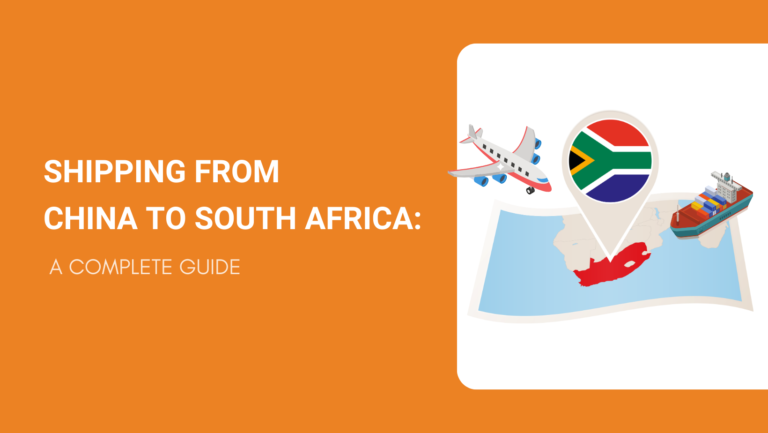Shipping from China to South Africa has become an integral part of global trade, reflecting the strong economic ties between the two countries.
Insightful logistics strategies and a thorough understanding of the shipping process are essential whether you’re an established business or a budding entrepreneur.
This guide provides you with valuable information, ensuring that your goods move smoothly and efficiently from Chinese ports to their South African destinations.
Navigating through the complexities of international shipping, you’ll learn about the range of freight options available, including sea and air transport, as well as the importance of customs compliance.
With the right freight forwarder, you can even optimize costs and ensure that your shipment arrives on time. Through this article, empower yourself with knowledge to streamline your shipping experience.

The Trade Relationship between China and South Africa
The economic ties between China and South Africa have steadily strengthened, becoming pivotal for your business in international trade.
Knowing the ins and outs of these relations is key to optimizing your supply chain management and ensuring efficient shipping processes.
Bilateral Trade Agreements
Recent years have seen numerous trade agreements blossom, greatly benefitting both countries.
These agreements are crucial because they often provide reduced tariffs and smoother customs procedures, which directly impact the cost and speed of shipping goods.
Economic Partnership
Your shipping endeavors from China to South Africa benefit from an economic partnership that prioritizes trade growth. This relationship is not just about numbers; it’s about establishing a reliable trade route for a wide range of products.
As an e-commerce expert, you should remember that China’s robust exports include electronics and machinery, items essential for your business operations.
Importance in International Shipping
With trade between the two nations reaching new highs, your shipping plans can take advantage of the expanded volume of cargo moving back and forth.
The volume growth has allowed for more frequent shipping services, which translates to better options for you to get your inventory when you need it.
Supply Chain Management
Efficiently managing your supply from China is made simpler due to the well-negotiated trade relations.
A stable political and trading relationship equates to more predictable lead times and shipping schedules, critical aspects of any successful international business.
By staying informed about the trade dynamics between China and South Africa, you can better prepare your business for the intricacies of global shipping, and potentially reap the rewards of these countries’ strong economic connections.
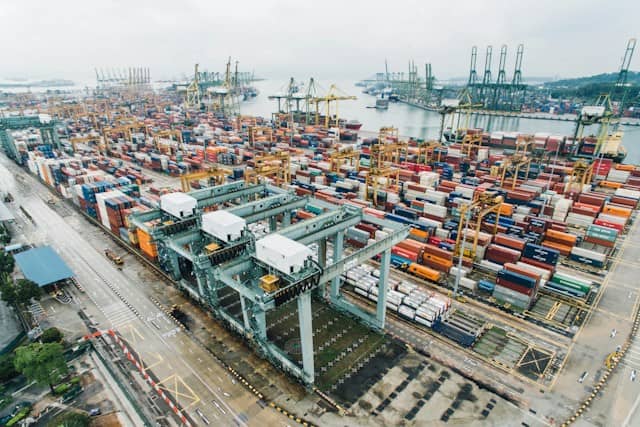
Shipping Options (China to South Africa)
When considering shipping from China to South Africa, you have two primary options: air freight and sea freight. Both have distinct advantages and limitations, crucial in your logistical planning and supply chain management.
Air Freight
Pros:
- Faster transit: Your items reach South Africa much quicker, ideal for time-sensitive cargo.
- Less handling: Generally involves less cargo handling, reducing the risk of damage.
- High security: Airports maintain strict security measures, safeguarding your goods.
- Frequent schedules: Flights are more frequent, offering flexibility in shipping schedules.
Cons:
- More expensive: Air freight tends to be pricier compared to sea transport.
- Limited capacity: You may face restrictions on the size and quantity of your goods.
- Weather dependent: Flights can be delayed by poor weather conditions, impacting your timeline.
Sea Freight
Pros:
- Cost-effective: Shipping large volumes at a lower cost is more feasible by sea.
- Heavy and bulky items: Sea freight can accommodate larger and heavier cargo easily.
- Eco-friendlier: Maritime transport has a smaller carbon footprint compared to air freight.
Cons:
- Slower: Ocean shipping is time-consuming, and not suitable for urgent deliveries.
- Complex logistics: Requires more logistical planning and might be affected by port congestion.
- Customs and regulations: Ensuring compliance with customs regulations can be more challenging and time-consuming.
Your choice between air and sea will depend on your needs for speed, cost, and volume.
Engaging a professional freight forwarder can help navigate these options, handle your cargo, and ensure compliance with trade routes and customs regulations.
Make sure to consider all aspects of your shipping needs to select the most appropriate method for your goods.
Top-Rated China Freight Forwarder
Expert Shipping Solutions for Your Needs
Key Ports and Logistics Hubs in China and South Africa
When you’re looking at shipping from China to South Africa, understanding the key ports and logistics hubs in both countries is crucial.
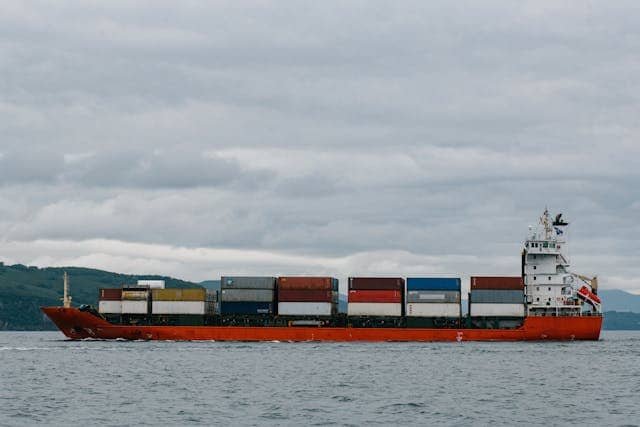
In China, the major shipping ports are part of the country’s backbone for international trade.
Shanghai is the world’s busiest container port, vital for your cargo’s journey.
Just south, Ningbo-Zhoushan offers direct maritime access and extensive logistical capabilities.
Qingdao, northern China, is another crucial hub, with modern facilities and a strategic position for global shipping routes.
South Africa’s primary port for your imports is the Port of Durban, the busiest in the southern hemisphere and a key player in maritime transport.
The Port of Cape Town handles a large amount of container traffic, while the Port of Port Elizabeth is essential for automotive components and cargo handling.
Logistical planning includes considering the efficiency of transferring your goods from ship to shore, then on to their final destination.
Both countries have made significant investments in infrastructure to facilitate smooth transportation.
Here’s a snapshot of key logistics hubs to keep in mind:
| China | South Africa |
| Shanghai Port | Port of Durban |
| Ningbo-Zhoushan Port | Port of Cape Town |
| Qingdao Port | Port of Port Elizabeth |
| Shenzhen Port | Port of East London |
| Guangzhou Port | Port of Richards Bay |
Remember, each of these ports has its own advantages and strategic importance.
Shanghai Port services a vast hinterland, making it a pivotal maritime hub. In South Africa, the Port of Durban is your gateway for reaching markets within the country and to the rest of the continent.
Efficient cargo handling and logistical connectivity are what make these ports stand out, ensuring your goods are transported smoothly and swiftly to their destination.
Cost Considerations When Shipping from China to South Africa
When you’re planning to ship goods from China to South Africa, understanding the cost considerations is crucial for efficient supply chain management.
Several factors contribute to the total cost, and each of these must be meticulously accounted for to ensure your shipping process is as cost-effective as possible.
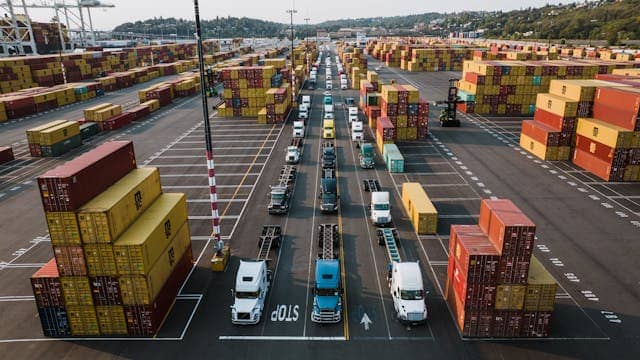
Freight Charges
Freight charges are typically the most significant expense. The choice between air and sea freight impacts your costs dramatically.
While air freight is faster, it’s also more expensive. In contrast, sea freight is more economical but requires longer transit times.
Below is a table of pricing estimates when shipping from China to South Africa:
| Shipping Method | Cost Range (in USD) |
| Air Freight | 4 to 7.9 per kg |
| Sea Freight (20-ft Container) | 1,800 to 1,860 |
| Sea Freight (40-ft Container) | Approximately 2,530 |
Customs Duties
Customs duties are another essential factor to budget for. These are fees charged by the South African government on imported goods and vary according to the type of goods you’re importing.
To minimize costs:
- Thoroughly research the latest customs regulations and duty rates.
- Work with a reliable freight forwarder to navigate the complexities of international shipping.
When planning your shipment, consider the following to keep costs down:
- Packaging efficiency: Optimize packaging to save space, and thus, reduce costs.
- Consolidation: Combine shipments when possible to take advantage of lower volume rates.
- Timing: Plan for off-peak periods if time allows, possibly benefiting from lower rates.
Remember, detailed planning and understanding every expense involved will keep you a step ahead in optimizing your shipping costs.
Transit Times and Scheduling
When you’re looking to ship goods from China to South Africa, understanding the transit times and scheduling is key to smooth operations. Various shipping methods can significantly impact how fast your cargo arrives.
Sea Freight is often the most economical option for large shipments. Expect an average transit time of 20-45 days, depending on your final port of destination in South Africa. The most common sea routes end in ports like Cape Town or Durban.
Air Freight is your quick alternative, usually taking around 5-10 days. It’s perfect for time-sensitive goods, though it may cost more. Major airports involved in this trade route include PEK (Beijing) and JNB (Johannesburg).
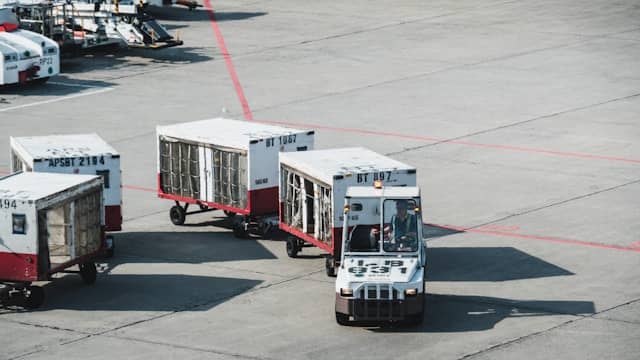
Here’s a quick glance at the average transit times:
| Mode of Transport | Point of Departure | Destination | Transit Time |
| Sea Freight | Shanghai | Durban | 22 days |
| Sea Freight | Shanghai | Cape Town | 27 days |
| Air Freight | PEK | JNB | 19 hours |
Remember, logistical planning plays a pivotal role in managing these transit times. Your choice of direct routes or stops along the way can affect schedules.
Also, keep in mind that seasons and holidays can influence the timing and availability of shipping options.
Despite the best planning, unforeseen delays can happen. Customs clearances, weather conditions, or political events may impact your shipment’s arrival.
It’s essential to factor in these variables for a buffer in your schedule, ensuring you meet your deadlines without stress.
Customs Clearance and Compliance
When you’re importing goods from China to South Africa, dealing with customs clearance is essential. Customs regulations are enforced to control the flow of goods across borders and ensure compliance with local laws.
You’ll need the proper paperwork for a seamless process. Required documents typically include:
- Bill of Lading: Ensure you have one negotiable and two non-negotiable copies.
- Commercial Invoice: This declares the value of your goods for assessment of duties and taxes.
- Packing List: Details the specifics of what is being shipped.
- Certificate of Origin: Verifies your goods are manufactured in China.
- Import Declaration: A statement made to the South African Revenue Service about the imported goods.
Understanding Regulations
Familiarize yourself with the list of restricted imports, which includes weaponry, drugs, toxic substances, or counterfeit items.
As for cargo handling, remember that once your shipment arrives, it will be inspected to verify compliance with the declared information. Your goods will only be released after all duties and taxes are settled.
For the official procedures and updates on customs clearance, the South African Revenue Service – SARS provides valuable resources and detailed guides. Keep your shipping plans aligned with the latest information to avoid any delays or additional costs.

How to Choose the Right Freight Forwarder
When you’re gearing up to ship goods from China to South Africa, selecting the right freight forwarder is a critical step. Here’s how to ensure you make the best choice for your logistical planning needs:
1. Research Potential Freight Forwarders. Start by gathering a list of potential freight forwarders experienced in China to South Africa shipments. It’s essential they understand both market’s regulations.
2. Verify Credentials. Ensure they have valid licenses and are registered with relevant authorities for shipping and forwarding.
3. Evaluate Their Network. Your forwarding agent should have a robust network in South Africa to handle your cargo efficiently.
4. Compare Services.
- Speed: How quickly they can ship your goods.
- Cost: Get detailed quotes to compare.
- Service Level: Door-to-door delivery options, customs clearance, and storage.
5. Check References. Ask for testimonials from other businesses that have shipped similar goods.
6. Discuss Your Needs. Talk about your specific requirements, including logistical planning, packaging, and handling.
Top-Rated China Freight Forwarder
Expert Shipping Solutions for Your Needs
FAQs about Shipping from China to South Africa
Navigating the process of shipping between China and South Africa can be complex, but with the right knowledge, you can ensure efficient and cost-effective operations.
Here are some frequently asked questions that cover the essentials of shipping logistics, customs regulations, and costs involved.
What Are Some Tips for Efficient Shipping from China to South Africa?
To optimize shipping efficiency from China to South Africa, it’s crucial to:
- Plan ahead by understanding the peak seasons and booking your shipments in advance.
- Choose the most suitable transport mode (air or sea) based on the urgency and volume of cargo.
- Collaborate with a reliable freight forwarder who is experienced in the trade routes and customs regulations between the two countries.
What Are Some Factors That Affect Shipping Costs?
Shipping costs can vary widely due to several factors:
- Weight and volume of the cargo.
- Type of transport: Air freight is faster but more expensive than sea freight.
- Fuel prices and seasonal demands can impact costs.
- Customs duties and handling fees are also substantial cost components.
What Are the Prohibited Items to Ship to South Africa?
There are restrictions on what can be shipped to South Africa. Prohibited items typically include, but are not limited to:
- Illegal drugs and substances.
- Counterfeit goods and pirated materials.
- Certain agricultural products that may threaten the ecosystem.
Always check the latest customs regulations to confirm which items are banned.
How Much Is the Import Tax Duty from China to South Africa?
The import tax duty for shipments from China to South Africa depends on the following:
- Value, weight, and category of the goods being imported.
- Current tariff rates as determined by the South African Revenue Service.
Transporting goods internationally involves complex layers of logistical planning and cargo handling; understanding these can help in cost reduction.
Embarking on Efficient Shipping from China to South Africa
When considering shipping from China to South Africa, it is crucial to choose the most efficient method to balance speed and cost.
Sea freight offers significant savings and is suitable for bulk shipments, while air freight ensures faster delivery for time-sensitive goods.
Customs clearance in South Africa is a vital step that involves document verification and ensuring compliance with import regulations. Prepare necessary documents such as the bill of lading, commercial invoice, and packing list.
For a comprehensive solution that covers all aspects of your shipping needs, consider our freight forwarding services. We offer end-to-end logistics support, managing everything from pickup at the Chinese supplier to final delivery in South Africa.
To get started with a tailored shipping plan that includes freight forwarding, request a freight forwarding quote today.
If sourcing quality products is your aim, don’t hesitate to request a free sourcing quote. It’s the first step towards a reliable and cost-effective shipping experience.
